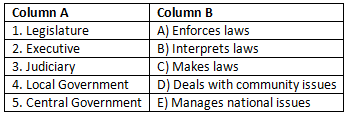Worksheet: Governance | Social Studies (SST) Class 6 PDF Download
| Table of contents |

|
| Multiple Choice Questions (MCQs) |

|
| Fill in the Blanks |

|
| True or False |

|
| Match the Following |

|
Multiple Choice Questions (MCQs)
Q1: Which branch of government is responsible for making laws?
(a) Executive
(b) Legislature
(c) Judiciary
(d) Local Government
Q2: What is the highest level of government in India?
(a) Local Government
(b) State Government
(c) Central Government
(d) Municipal Government
Q3: Who is considered the 'Missile Man of India'?
(a) Dr. Rajendra Prasad
(b) Dr. A.P.J. Abdul Kalam
(c) Dr. Vikram Sarabhai
(d) Dr. Homi Bhabha
Q4: Which organ of government ensures fairness and justice?
(a) Executive
(b) Legislature
(c) Judiciary
(d) Parliament
Q5: What does 'Satyameva Jayate' mean?
(a) Victory through democracy
(b) Truth alone triumphs
(c) Justice for all
(d) Unity in diversity
Fill in the Blanks
Q1: The three branches of government are the __________, __________, and __________.
Q2: The local government handles issues specific to __________.
Q3: The Central Government is responsible for national __________.
Q4: In India, the Parliament consists of the Lok Sabha and the __________.
Q5: Dr. A.P.J. Abdul Kalam served as the __________ of India.
 |
Test: Grassroots Democracy - Governance - 2
|
Start Test |
True or False
Q1: The executive branch is responsible for creating laws.
Q2: The judiciary checks if laws made by the legislature are fair.
Q3: Local governments handle issues that affect the entire country.
Q4: 'Dharma' in the Supreme Court's motto refers to the concept of righteousness.
Q5: Every citizen in India has the right to vote at the age of 21.
Match the Following

You can access the solutions to this worksheet here.
|
69 videos|387 docs|80 tests
|
FAQs on Worksheet: Governance - Social Studies (SST) Class 6
| 1. What is the importance of governance in society? |  |
| 2. What are the different types of governance? |  |
| 3. How can citizens participate in governance? |  |
| 4. What role do governments play in ensuring good governance? |  |
| 5. How does good governance contribute to development? |  |




















